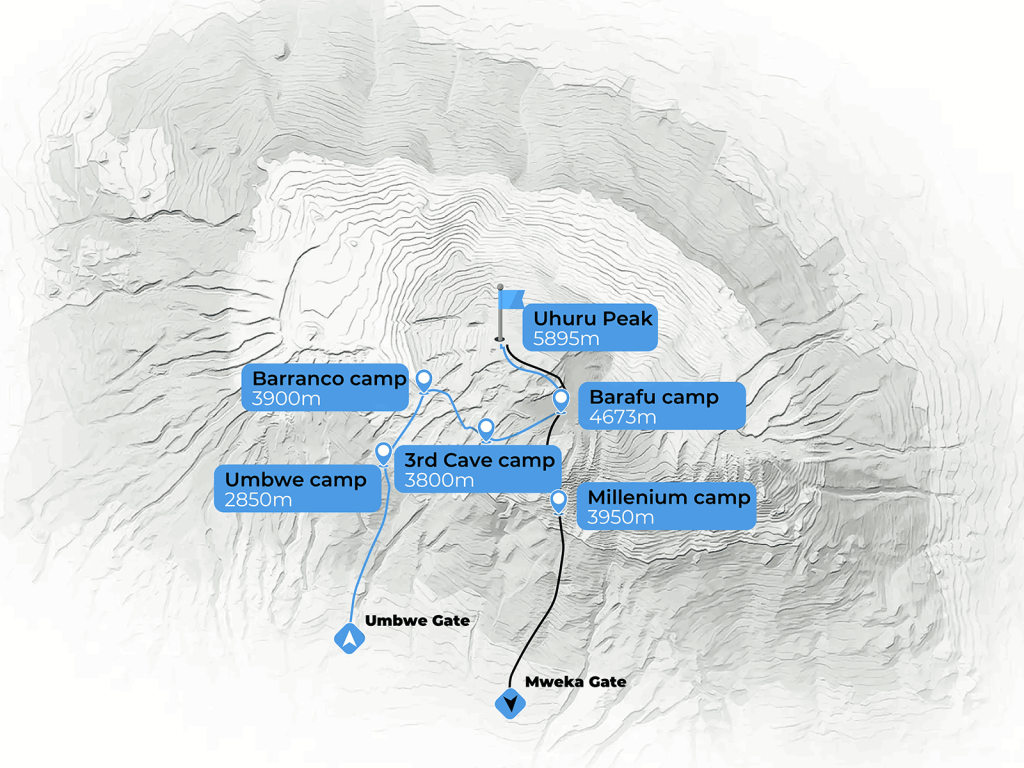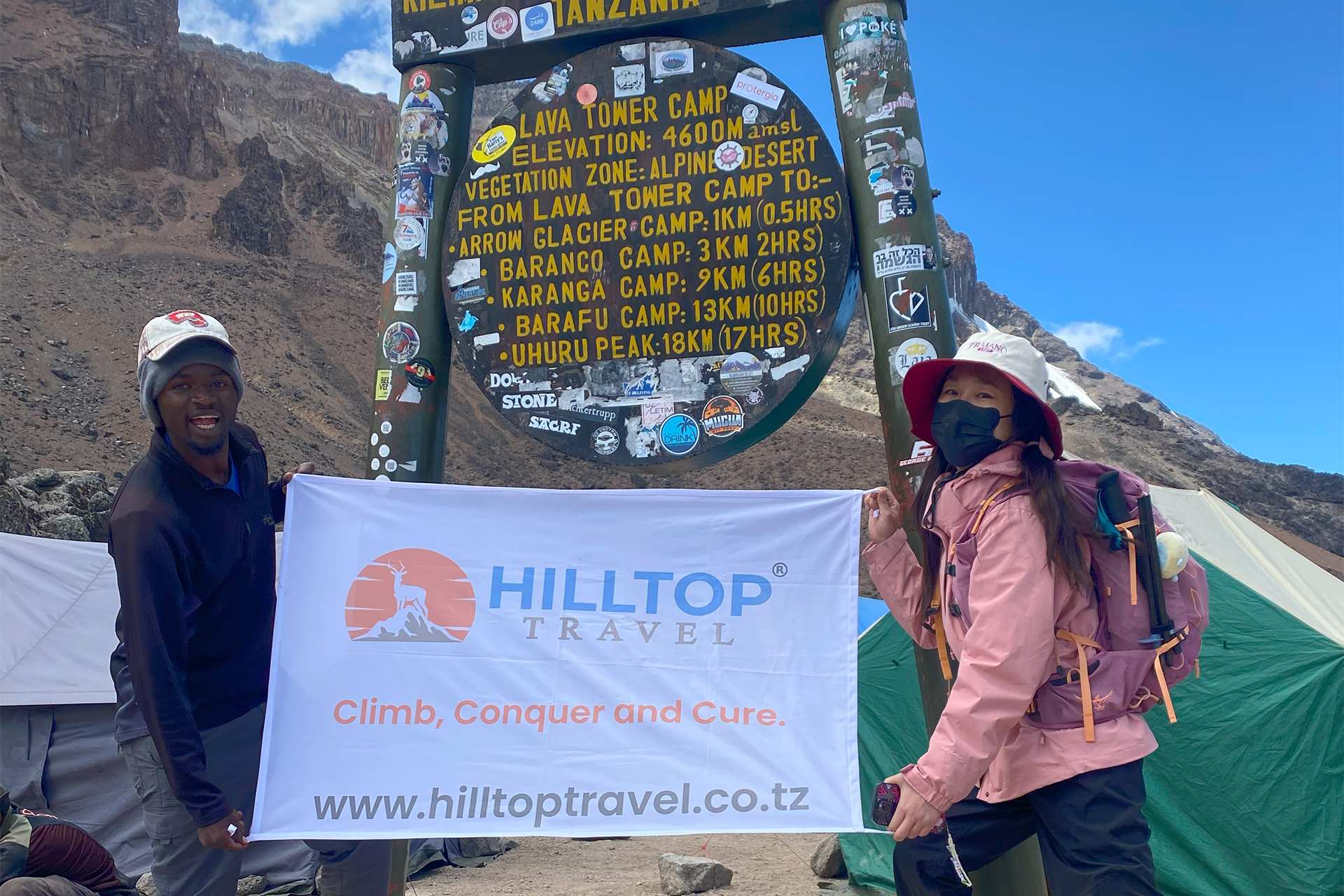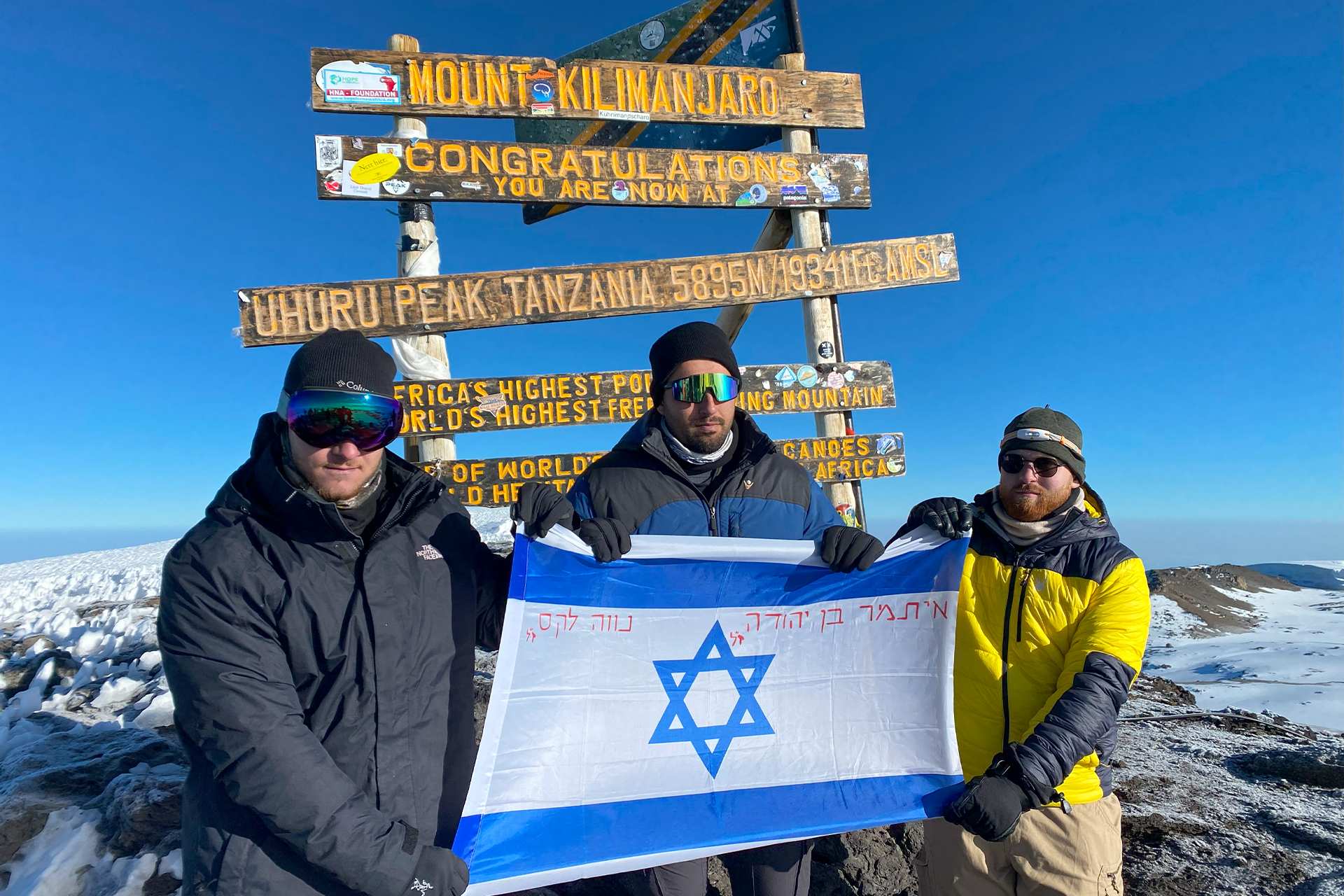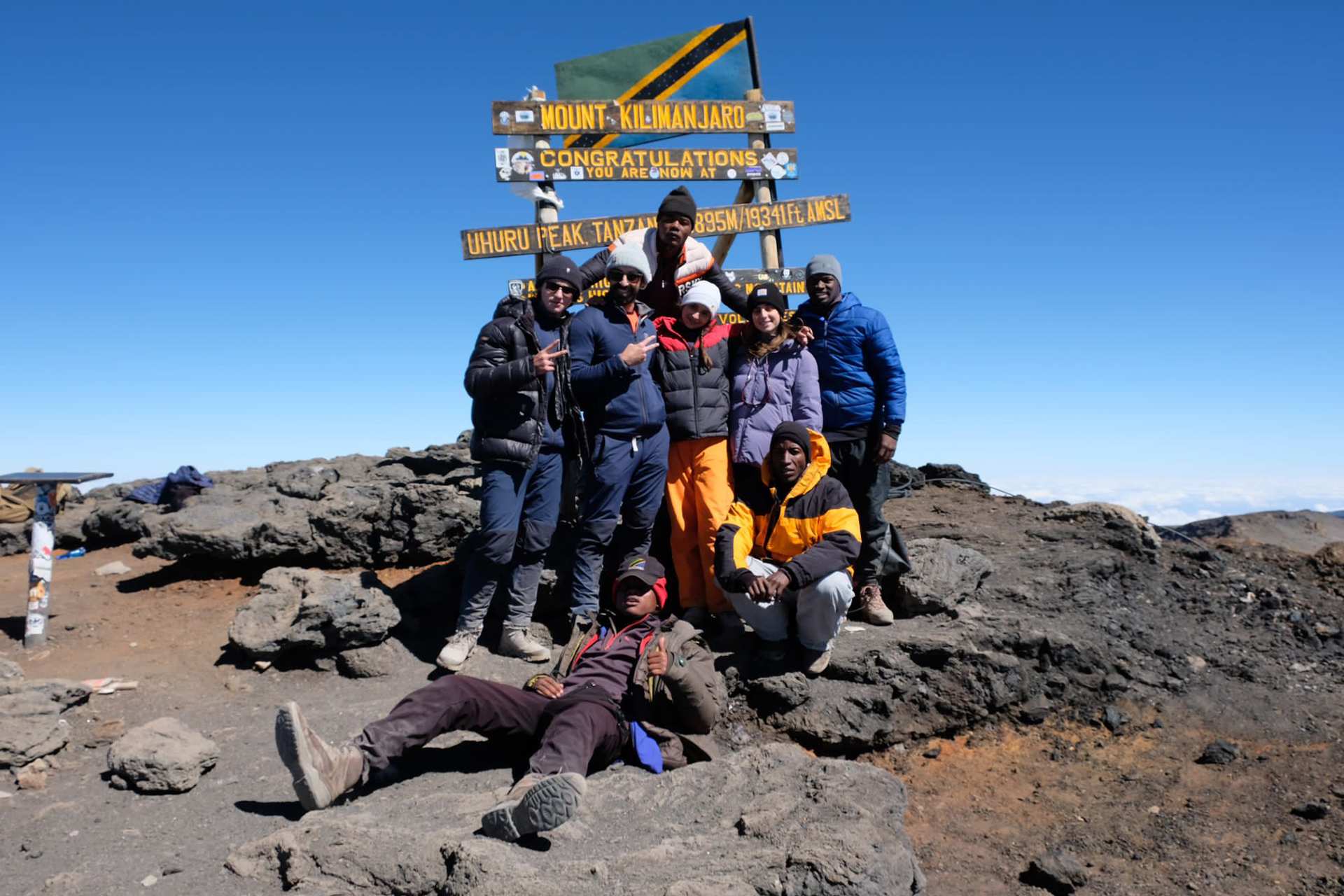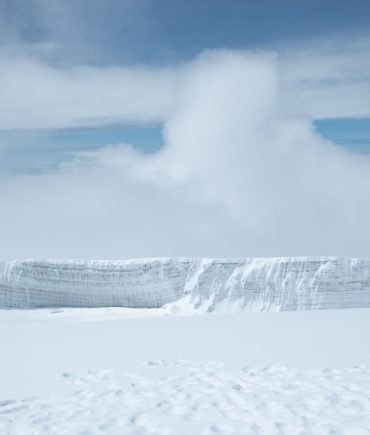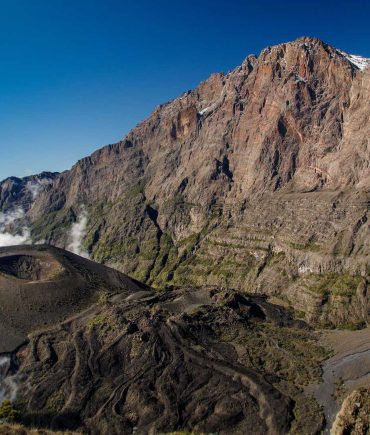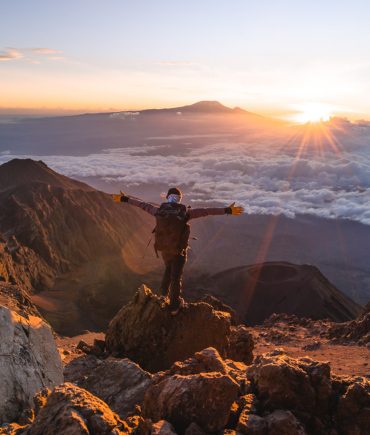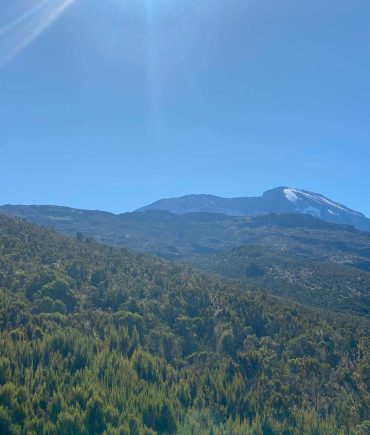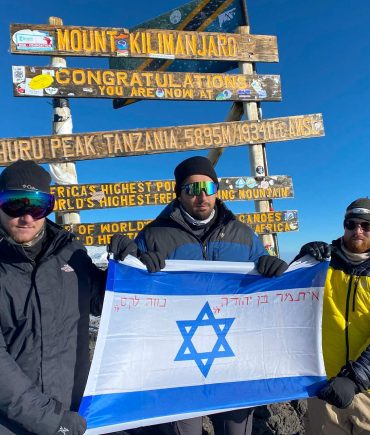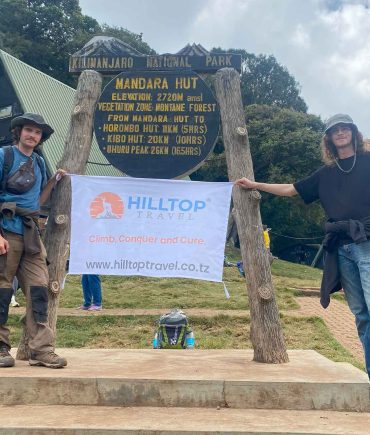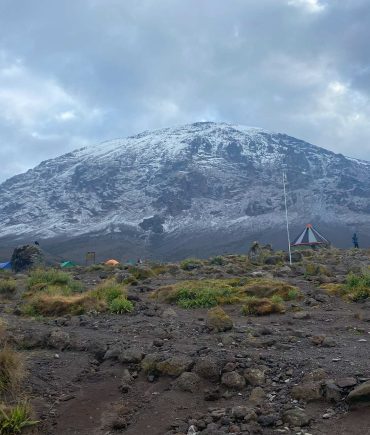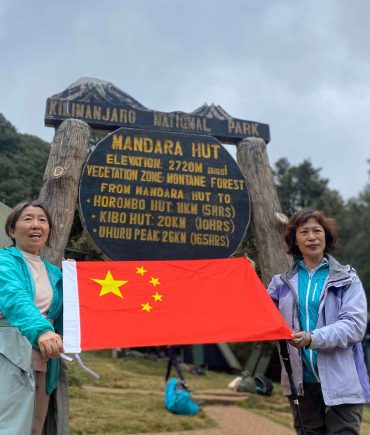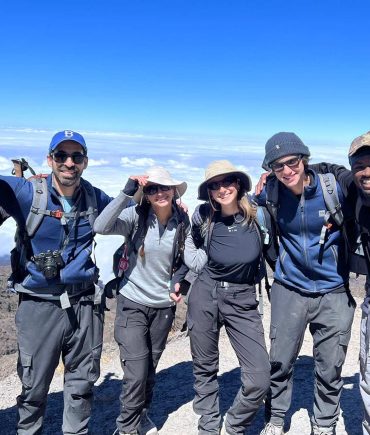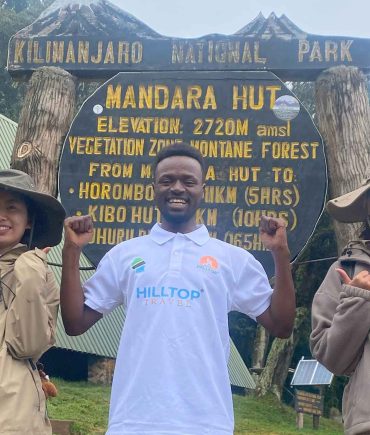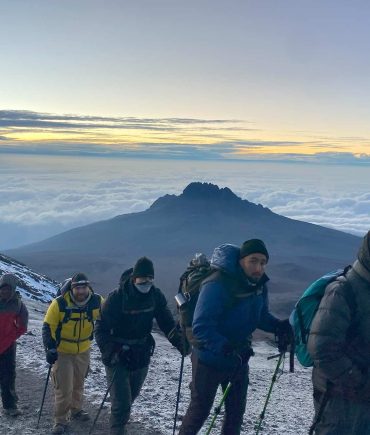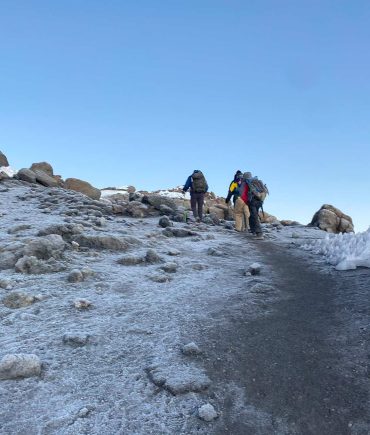Tour overview
The Umbwe route is a short, steep and direct route. It is considered to be very difficult and is the most challenging way up Mount Kilimanjaro. Due to the quick ascent, Umbwe does not provide the necessary stages for altitude acclimatization. Although the traffic on this route is very low, the chances of success are also low. The route is offered at a minimum of six days, though seven days is recommended when attempting this route. The Umbwe route should only be attempted by those who are very strong hikers and are confident in their ability to acclimatize. However, overall, the Umbwe route is not recommended and we discourage its usage for our clients.
Itinerary summary
Day 1: Umbwe Gate (1,800m/5,905ft) to Cave Bivouac Camp (2,850m/9,350ft)
Day 2: Cave Bivouac (2,850m/9,350ft) to Barranco Camp (3,950m/12,960ft)
Day 3: Barranco Camp (3,950m/12,960ft) to Karanga Valley (4,200m/13,780ft)
Day 4: Karanga Valley (4,200m/13,780ft) to Barafu Camp (4,600m/15,100ft)
Day 5: Barafu Camp (4,600m/15,100ft) to Uhuru Peak (5,895m/19,340ft) to Mweka Camp (3,100m/10,170ft)
Day 6: Mweka Camp (3,100m/10,170ft) to Mweka Gate (1,500m/4,920ft)
Itinerary Details
Every day of our itinerary has been meticulously crafted to ensure you have an unforgettable experience. From discovering iconic landmarks to savoring delectable local dishes, each day promises adventure and thrill. Come along with us as we guide you through a journey across some of the most captivating destinations on the planet.
After a hearty breakfast, a short drive will take you from Moshi to the Umbwe Gate, where you’ll complete park registration and officially begin your trek. The trail winds through lush rainforest, offering glimpses of exotic flora and fauna along the way. As you ascend, you’ll gradually gain elevation, eventually reaching Umbwe Cave Camp, your home for the night. Dinner will be served amidst the tranquility of the forest, setting the stage for the days ahead.
- Elevation: 1,000m/3,280ft to 2,850m/9,350ft
- Hiking Time: 5-7 hours
- Distance: 11km/7 miles
- Difficulty: Moderate to Difficult
- Habitat: Rainforest
Leaving Umbwe Cave Camp behind, you’ll continue your journey through diverse terrain, including the challenging Barranco Wall. As you climb, the scenery changes from lush forest to open moorland, offering stunning views of Kilimanjaro’s towering peaks. By midday, you’ll arrive at Barranco Camp, nestled in a scenic valley. Here, you’ll rest and recharge for the adventures to come.
- Elevation: 2,850m/9,350ft to 3,960m/13,000ft
- Hiking Time: 4-6 hours
- Distance: 6km/3.7 miles
- Difficulty: Difficult
- Habitat: Moorland
Today’s trek takes you from Barranco Camp to Karanga Camp, traversing the rugged landscapes of Kilimanjaro’s alpine desert. Along the way, you’ll navigate steep ridges and valleys, with breathtaking vistas unfolding at every turn. By late afternoon, you’ll arrive at Karanga Camp, where you’ll spend the night beneath the star-studded African sky.
- Elevation: 3,960m/13,000ft to 4,035m/13,106ft
- Hiking Time: 4-5 hours
- Distance: 5km/3.1 miles
- Difficulty: Moderate
- Habitat: Alpine Desert
As you ascend to Barafu Camp, the air grows thinner, and the landscape transforms into a barren, lunar-like expanse. Despite the challenging terrain, the camaraderie among your fellow trekkers and the promise of reaching new heights keeps you motivated. Upon reaching Barafu Camp, you’ll enjoy a hearty meal before resting in preparation for the final push to the summit.
- Elevation: 4,035m/13,106ft to 4,640m/15,223ft
- Hiking Time: 4-5 hours
- Distance: 4km/2.5 miles
- Difficulty: Moderate to Difficult
- Habitat: Alpine Desert
Today is the culmination of your journey as you embark on the exhilarating trek to Uhuru Peak, the highest point in Africa. Beginning in the darkness of night, you’ll navigate steep switchbacks and icy terrain under the guidance of your experienced guides. As the sun rises over the horizon, you’ll reach Stella Point before continuing to the summit. Upon reaching Uhuru Peak, you’ll be rewarded with awe-inspiring panoramic views and a profound sense of accomplishment. After celebrating your achievement, you’ll begin the descent to Mweka Camp, where a warm meal and well-deserved rest await.
- Elevation: 4,640m/15,223ft to 5,895m/19,341ft, then down to 3,100m/10,170ft
- Hiking Time: 10-14 hours
- Distance: 17km/10.5 miles
- Difficulty: Very Difficult
- Habitat: Arctic to Rainforest
Your final day on the mountain begins with a leisurely descent through the lush rainforest, retracing your steps back to Mweka Gate. Along the way, you’ll savor the sights and sounds of the forest, reflecting on the incredible journey you’ve undertaken. Upon reaching Mweka Gate, you’ll bid farewell to your guides and porters before transferring back to Moshi. Here, you’ll enjoy a hot shower, a delicious meal, and a well-deserved night of rest in the comfort of your hotel.
- Elevation: 3,100m/10,170ft to 1,650m/5,413ft
- Hiking Time: 3-4 hours
- Distance: 10km/6.2 miles
- Difficulty: Moderate
- Habitat: Rainforest
Includes & Excludes
All Government taxes and levies including 18% VAT.
Kilimanjaro National Park Entrance fees
Clean purified drinking water
Airport pick up and drop off
2 Nights’ accommodation in Moshi is or Arusha included
All transfers to the mountain and back to your Moshi hotel
Professional, experienced, mountain guides
Guides, Porters, cook salaries and park fees
Quality, waterproof, four seasons private mountain sleeping tents
Sleeping Mattress
All meals while on the mountain
Quality mess tents with table and chairs
Large portions of fresh, healthy, nutritious food
International or Local Flights
Optional activities
Alcoholic and soft drinks
Visa fees
Tips
Personal spending money for souvenirs etc.
Travel insurance
Top Experiences
Frequently Asked Question
There are seven main routes to climb Mount Kilimanjaro: Marangu, Machame, Lemosho, Shira, Rongai, Northern Circuit, and Umbwe. Each route varies in difficulty, scenery, and duration. The Marangu Route is known as the "Coca-Cola" route and is the only one offering hut accommodations, while the Machame Route, also called the "Whiskey" route, is popular for its diverse and scenic paths. The Lemosho and Shira routes offer beautiful vistas and lower traffic, making them ideal for those seeking a more solitary experience. Rongai is the only route starting from the north, and the Northern Circuit is the longest route, offering the most acclimatization time. Umbwe is the steepest and most challenging route, recommended for experienced climbers.
The duration of the climb depends on the route chosen. Typically, it takes between 5 to 10 days to reach the summit and descend. For instance, the Marangu Route can be completed in 5-6 days, while the Lemosho Route generally takes 7-8 days. The Northern Circuit, being the longest, can take 9-10 days. Additional acclimatization days can improve summit success rates and overall experience.
The best times to climb Mount Kilimanjaro are during the dry seasons: from January to early March and from June to October. These periods offer the best weather conditions, with less rain and clearer skies. Climbing during the wet seasons, from April to May and November to December, can be more challenging due to muddy trails and poor visibility.
No technical climbing skills are required to climb Kilimanjaro. It is a non-technical trek, meaning no ropes or special equipment are needed. However, it is a physically demanding hike due to the high altitude and varying terrain. Good physical fitness and proper acclimatization are essential for a successful climb.
Accommodations on Kilimanjaro vary by route. The Marangu Route offers hut accommodations with basic facilities such as beds, mattresses, and communal dining areas. Other routes, such as Machame, Lemosho, and Rongai, require camping in tents. Porters carry the camping equipment and set up the tents at designated campsites.
Physical preparation is crucial for a successful Kilimanjaro climb. It is recommended to start training at least 2-3 months before the climb. Focus on aerobic exercises such as hiking, running, and cycling to build endurance. Strength training for legs, core, and upper body will also be beneficial. Practice hiking with a backpack to simulate the conditions on the mountain.
Packing for Kilimanjaro requires careful consideration of the weather and terrain. Essential items include sturdy hiking boots, warm clothing (layers), a good quality sleeping bag, a backpack, trekking poles, and a headlamp. Other important items are sun protection, a first aid kit, hydration systems, and high-energy snacks. A detailed packing list is usually provided by tour operators.
Yes, altitude sickness is common on Kilimanjaro due to the rapid ascent to high altitudes. Symptoms can include headaches, nausea, dizziness, and fatigue. Proper acclimatization, such as following the "pole pole" (slowly, slowly) approach, staying hydrated, and taking acclimatization days, can help mitigate the effects. Some climbers may also take medication like Diamox to prevent altitude sickness.
Yes, it is mandatory to climb Kilimanjaro with a licensed guide and porters. The Tanzanian government requires all climbers to be accompanied by a registered tour operator. Guides are experienced in navigation, first aid, and handling altitude-related issues, ensuring the safety and success of your climb.
The cost of climbing Kilimanjaro can vary widely depending on the route, duration, and tour operator. On average, expect to pay between $1,500 and $4,000 per person. This cost typically includes park fees, guide and porter fees, food, and accommodations. Additional expenses may include flights, gear, tips, and personal expenses.
Summit success rates vary by route and individual preparation. On average, the overall success rate for reaching the summit is around 65-75%. Routes that allow for more acclimatization days, such as Lemosho and Northern Circuit, generally have higher success rates, often exceeding 85%.
The food provided on Kilimanjaro is typically high in carbohydrates and calories to meet the energy demands of the climb. Meals often include porridge, bread, fruits, vegetables, pasta, rice, and meat. Vegetarian and special dietary requirements can usually be accommodated with prior notice. Hydration is also crucial, and climbers are encouraged to drink plenty of water and hot beverages like tea.
Inquiry This Tour
Verified My friend and I had an amazing vacation and made many memories that will last a lifetime. Our September 29th day trip to Mandara Hut along the Marangu Route was fantastic! My friend and I had an amazing vacation and made many memories that will last a lifetime. Our amazing guide, Daniel, made the walk both entertaining and instructive with his knowledge of Kilimanjaro and his enthusiasm for the mountain. The feeling of achievement at Mandara Hut, the breathtaking vistas, and the thick rainforest were all ideal. The owner, Daniel, made sure we were comfortable and educated at every turn, going above and beyond to make our stay unforgettable. Hilltop Travel and hiring Daniel as your guide are both excellent choices if you're thinking about visiting Kilimanjaro.Verified Any picture of kilimanjaro summit, Thank you to Hilltop Travel for making my recent day trip to Mount Kilimanjaro via the Marangu Route so unforgettable. Every step of the process was smooth and well-planned. An authority on the local landscape and customs, our guide ensured our comfort and kept us informed at every turn. The actual trek was magnificent, with beautiful views of the surrounding forests and towering hills. There were lots of opportunities for us to enjoy the breathtaking view, and the pace was ideal. Our guide provided fascinating information on the history of the mountain, the Chaga people's culture, and the local flora and fauna.Regardless of your level of competence, Hilltop Travel guarantees a safe, instructive, and genuinely remarkable Kilimanjaro experience. Highly recommended.Verified 7-day Machame trek with Hilltop Travel, Climbing Mount Kilimanjaro was an unforgettable adventure! I completed the 7-day Machame trek with Hilltop Travel, and I can’t recommend them enough. The entire journey, starting on July 23, 2024, was well-organized and expertly guided. From the very first step on the trail to the triumphant summit, the Hilltop Travel team provided exceptional support. A huge shoutout to our guide, Denis, whose unique approach truly made the journey special. His deep knowledge of the mountain, combined with his experience and calming presence, helped us navigate through the toughest parts of the trek. Denis not only guided us but also shared fascinating insights into the surrounding environment and local culture, which added so much to the experience. The support from Hilltop Travel team was also remarkable from the very start. Upon arrival at Kilimanjaro International Airport, the driver was waiting to pick us up, and we felt welcomed and well taken care of right from the start. Additionally, Daniel, the managing director, was incredibly helpful and attentive, ensuring everything went smoothly from the office side and checking in to make sure we had everything we needed. Their professionalism, knowledge, and attention to detail made the tough trek feel safe and enjoyable. The stunning landscapes and reaching the top were beyond words. If you're planning to conquer Kilimanjaro, climb with Hilltop Travel for an amazing experience.Verified My safari was Glorious My Mountain safari has been the best memory i made with my Girlfriend. We thought climbing a mountain was a very hard task but every step towards the roof of Africa was amaizing and with the help of wonderful guides from HillTop Travels just made things more easier. I look forward to booking my Safari with them because they made my experience worth it.Verified Good and frendly customer serviced The tour guides were exceptionally friendly and knowledgeable, providing fascinating insights that enriched my understanding and appreciation of the places we visited especially mount kilimanjaro. I felt well taken care of throughout the entire journey, and allowed me to truly relax and enjoy every moment.Verified kilimanjaro I recently climbed Kilimanjaro with Daniel as our mountain guide, and I couldn’t have asked for a better experience. Daniel is incredibly kind, intelligent, and very polite, with a great sense of humor that kept our spirits high throughout the journey. His expertise and leadership made me feel completely safe, and it was a true pleasure getting to know him and sharing this unique adventure. Highly recommended!
Excursions for Inspiration
Experience the awe-inspiring majesty of wildlife, the surreal beauty of natural wonders, captivating beaches, and Hiking on Mount KIlimanjaro with each unique Hilltop Travel. Not sure where to begin your journey? Whether it’s an adventure of a lifetime, a milestone celebration, or a well-deserved getaway, find joy in our curated collection of top destinations.

